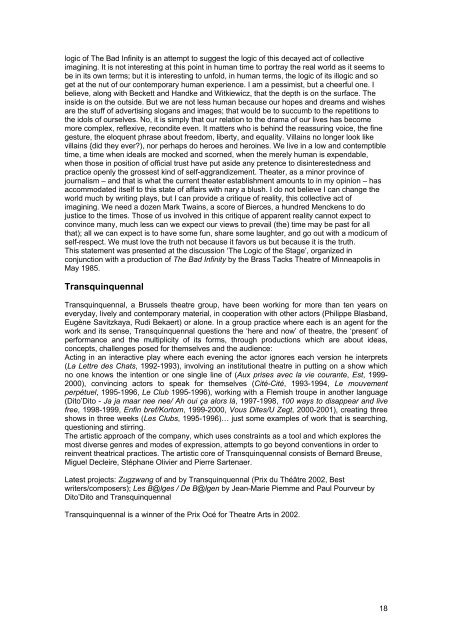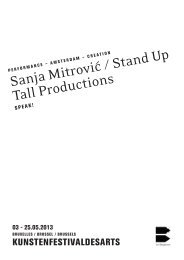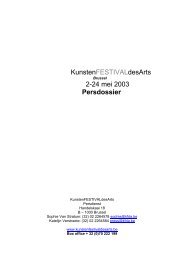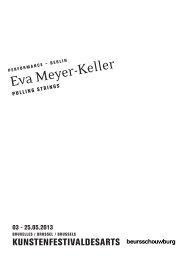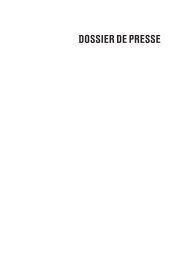Press File - Kunstenfestivaldesarts
Press File - Kunstenfestivaldesarts
Press File - Kunstenfestivaldesarts
Create successful ePaper yourself
Turn your PDF publications into a flip-book with our unique Google optimized e-Paper software.
logic of The Bad Infinity is an attempt to suggest the logic of this decayed act of collective<br />
imagining. It is not interesting at this point in human time to portray the real world as it seems to<br />
be in its own terms; but it is interesting to unfold, in human terms, the logic of its illogic and so<br />
get at the nut of our contemporary human experience. I am a pessimist, but a cheerful one. I<br />
believe, along with Beckett and Handke and Witkiewicz, that the depth is on the surface. The<br />
inside is on the outside. But we are not less human because our hopes and dreams and wishes<br />
are the stuff of advertising slogans and images; that would be to succumb to the repetitions to<br />
the idols of ourselves. No, it is simply that our relation to the drama of our lives has become<br />
more complex, reflexive, recondite even. It matters who is behind the reassuring voice, the fine<br />
gesture, the eloquent phrase about freedom, liberty, and equality. Villains no longer look like<br />
villains {did they ever?), nor perhaps do heroes and heroines. We live in a low and contemptible<br />
time, a time when ideals are mocked and scorned, when the merely human is expendable,<br />
when those in position of official trust have put aside any pretence to disinterestedness and<br />
practice openly the grossest kind of self-aggrandizement. Theater, as a minor province of<br />
journalism – and that is what the current theater establishment amounts to in my opinion – has<br />
accommodated itself to this state of affairs with nary a blush. I do not believe I can change the<br />
world much by writing plays, but I can provide a critique of reality, this collective act of<br />
imagining. We need a dozen Mark Twains, a score of Bierces, a hundred Menckens to do<br />
justice to the times. Those of us involved in this critique of apparent reality cannot expect to<br />
convince many, much less can we expect our views to prevail (the) time may be past for all<br />
that); all we can expect is to have some fun, share some laughter, and go out with a modicum of<br />
self-respect. We must love the truth not because it favors us but because it is the truth.<br />
This statement was presented at the discussion ‘The Logic of the Stage’, organized in<br />
conjunction with a production of The Bad Infinity by the Brass Tacks Theatre of Minneapolis in<br />
May 1985.<br />
Transquinquennal<br />
Transquinquennal, a Brussels theatre group, have been working for more than ten years on<br />
everyday, lively and contemporary material, in cooperation with other actors (Philippe Blasband,<br />
Eugène Savitzkaya, Rudi Bekaert) or alone. In a group practice where each is an agent for the<br />
work and its sense, Transquinquennal questions the ‘here and now’ of theatre, the ‘present’ of<br />
performance and the multiplicity of its forms, through productions which are about ideas,<br />
concepts, challenges posed for themselves and the audience:<br />
Acting in an interactive play where each evening the actor ignores each version he interprets<br />
(La Lettre des Chats, 1992-1993), involving an institutional theatre in putting on a show which<br />
no one knows the intention or one single line of (Aux prises avec la vie courante, Est, 1999-<br />
2000), convincing actors to speak for themselves (Cité-Cité, 1993-1994, Le mouvement<br />
perpétuel, 1995-1996, Le Club 1995-1996), working with a Flemish troupe in another language<br />
(Dito’Dito - Ja ja maar nee nee/ Ah oui ça alors là, 1997-1998, 100 ways to disappear and live<br />
free, 1998-1999, Enfin bref/Kortom, 1999-2000, Vous Dites/U Zegt, 2000-2001), creating three<br />
shows in three weeks (Les Clubs, 1995-1996)… just some examples of work that is searching,<br />
questioning and stirring.<br />
The artistic approach of the company, which uses constraints as a tool and which explores the<br />
most diverse genres and modes of expression, attempts to go beyond conventions in order to<br />
reinvent theatrical practices. The artistic core of Transquinquennal consists of Bernard Breuse,<br />
Miguel Decleire, Stéphane Olivier and Pierre Sartenaer.<br />
Latest projects: Zugzwang of and by Transquinquennal (Prix du Théâtre 2002, Best<br />
writers/composers); Les B@lges / De B@lgen by Jean-Marie Piemme and Paul Pourveur by<br />
Dito’Dito and Transquinquennal<br />
Transquinquennal is a winner of the Prix Océ for Theatre Arts in 2002.<br />
18


